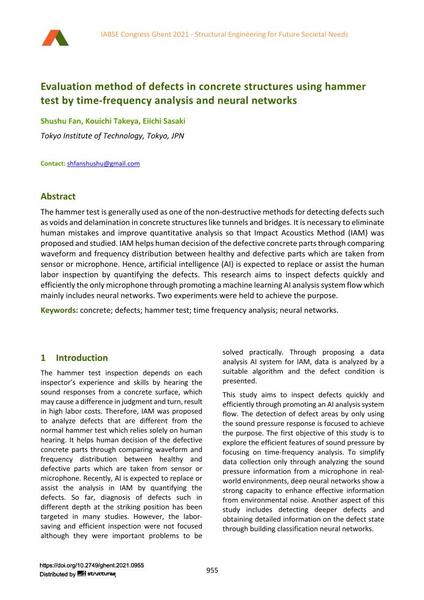Evaluation method of defects in concrete structures using hammer test by time-frequency analysis and neural networks

|
|
|||||||||||
Bibliographic Details
| Author(s): |
Shushu Fan
(Tokyo Institute of Technology, Tokyo, JPN)
Kouichi Takeya (Tokyo Institute of Technology, Tokyo, JPN) Eiichi Sasaki (Tokyo Institute of Technology, Tokyo, JPN) |
||||
|---|---|---|---|---|---|
| Medium: | conference paper | ||||
| Language(s): | English | ||||
| Conference: | IABSE Congress: Structural Engineering for Future Societal Needs, Ghent, Belgium, 22-24 September 2021 | ||||
| Published in: | IABSE Congress Ghent 2021 | ||||
|
|||||
| Page(s): | 955-964 | ||||
| Total no. of pages: | 10 | ||||
| DOI: | 10.2749/ghent.2021.0955 | ||||
| Abstract: |
The hammer test is generally used as one of the non-destructive methods for detecting defects such as voids and delamination in concrete structures like tunnels and bridges. It is necessary to eliminate human mistakes and improve quantitative analysis so that Impact Acoustics Method (IAM) was proposed and studied. IAM helps human decision of the defective concrete parts through comparing waveform and frequency distribution between healthy and defective parts which are taken from sensor or microphone. Hence, artificial intelligence (AI) is expected to replace or assist the human labor inspection by quantifying the defects. This research aims to inspect defects quickly and efficiently the only microphone through promoting a machine learning AI analysis system flow which mainly includes neural networks. Two experiments were held to achieve the purpose. |
||||
| Keywords: |
concrete defects neural networks hammer test time frequency analysis
|
||||
| Copyright: | © 2021 International Association for Bridge and Structural Engineering (IABSE) | ||||
| License: | This creative work is copyrighted material and may not be used without explicit approval by the author and/or copyright owner. |
||||
